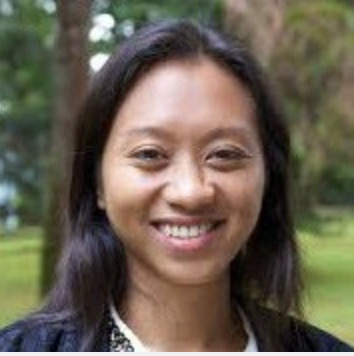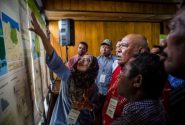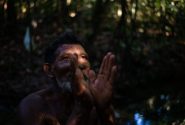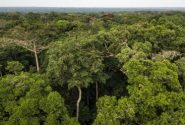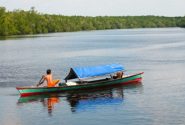
Countries in the developed world have pledged money and support to tropical forest countries in order to incentivize them to protect standing forest. CIFOR/Tomas Munita
BOGOR, Indonesia (27 May, 2013) – International efforts to reduce forest loss and degradation through the U.N.-backed REDD+ scheme are poised to see significant benefits flow to forest-rich developing countries. But the latest study by the Center for International Forestry Research (CIFOR) suggests that such benefits may not be distributed in ways that are fair and socially inclusive.
CIFOR’s project on REDD+ Benefit Sharing: Opportunities and Challenges in Developing Countries aims to improve the way REDD+ benefits are distributed to help ensure the scheme is equitable, efficient and effective.
“Our preliminary analysis looking at existing benefit sharing models in 13 REDD+ pilot countries including Brazil, Indonesia and Tanzania, has found that there are trade offs between being completely efficient and equitable and that these depend on the different approaches to benefit sharing,” said Grace Wong, CIFOR senior scientist with the project and co-author of the study.
Deforestation and forest degradation contributes to nearly 20 percent of global greenhouse gas emissions. To combat this, countries in the developed world have pledged money and support to tropical forest countries in order to incentivize them to protect standing forest – a scheme known as Reducing Emissions from Deforestation and forest Degradation or REDD+. The scale of the benefits is linked to rates of reduction in deforestation and degradation.
Q: What is benefit sharing in the context of REDD+ about?
“Benefit sharing is about the distribution of direct and indirect net gains from the implementation of REDD+.
Direct gains come in the form of monetary transfers while the indirect gains relate to how REDD+ implementation can provide clarity on land tenure issues, enhance forest management and governance, and improve ecosystem services such water provision.
We look at net gains because we have to acknowledge that there are costs involved; implementation, transaction and opportunity costs. The identification of groups who should benefit from REDD+ inevitably involves looking at who also incur the costs.”
Q: Who are the different groups identified as ‘beneficiaries’ of REDD+?
A: “Until now, there remains significant debate over whether benefits should be distributed to:
Those with legal claim or right to the land and forests: land owners, concession holders, and in some cases, governments. Given the lack of tenurial clarity in many developing countries, this might disadvantage the poor forest users who typically do not have legally recognized rights to the forest products or land;
Those who are and who can achieve reduction of emissions: this discourse is central to the efficiency and effectiveness objectives of REDD+;
Those who are already managing the forest sustainably: known as ‘forest stewards’ and are often indigenous groups;
Those who bear the various costs of implementing REDD+: government and law enforcement agencies, REDD+ project developers and implementers, and land owners or forest users who are forgoing profits from other land uses and whose livelihoods may be disrupted;
The poorest in the community: this relates to the pro-poor development approach;
Those who are effective facilitators of REDD+ implementation: government agencies at different levels, REDD+ project developers and NGO groups who facilitate implementation.
The different discourses on who should benefit can be conflicting. CIFOR’s research examines these debates and the trade offs resulting from the different discourses.”
Q: What are the trade-offs and risks involved?
A: “Distributing benefits to the poor and to those who already manage the forest sustainably is important from an equity point of view, but it may not necessarily be the most effective use of REDD+ funds because there is little additional gain in carbon terms.
From a technical point of view, the most effective and efficient distribution of benefits could see a transfer of funds to large land owners (and in the case on Indonesia, concession holders); those who potentially contribute to highest emission reductions and at the least cost.
However, this rewards those already deforesting or those who present the threat of doing so, acting as a perverse incentive for such behavior. In turn, it risks marginalizing the forest stewards – groups who are already practicing good forest management – and these include indigenous communities who are often already marginalized.”
Q: What has the preliminary analysis revealed about benefit sharing approaches in REDD+ pilot countries?
A: “We found that benefit-sharing approaches tend to be built upon existing models within each country, including market-based mechanisms such as ‘Payment for Environmental Services,’ community forest management systems, forest concession agreements and funding institutions.
The extent to which benefit sharing mechanisms can be effective, efficient and equitable depends on the level of accountability, transparency and financial management capacity of the state, which were found to be quite weak in most of the countries.
Challenges faced in many study countries included conflicting legal provisions, overlapping mandates and inconsistent implementation among government agencies, weak law enforcement, limited funding and staffing, corruption and elite capture.”
Q: What else needs to be considered if we are to achieve equitable, efficient and effective benefit sharing mechanisms?
A. “CIFOR is trying to push forward the discussion around rewarding individuals and communities who are already conserving and managing their forests in a sustainable manner.
The preliminary analysis has found that this argument has been absent in developing countries that tend to focus on compensating those who bear the costs and benefiting those with legal land rights, thus risking the marginalization of groups with customary or traditional land rights.
There will never be a win-win solution that will perfectly achieve all three ‘E’s – equity, efficiency and effectiveness. However, it is important that they are all considered equally in a process that involves transparent debate, discussion and equal participation.
I believe this is just as, or perhaps more important than the outcome because only with such a process can REDD+ be accepted and seen as legitimate within the country.”
For more information about the issues discussed in this story, please contact Grace Wong at g.wong@cgiar.org
This work forms part of the CGIAR Research Program on Forests, Trees and Agroforestry and is supported by the European Commission.
We want you to share Forests News content, which is licensed under Creative Commons Attribution-NonCommercial-ShareAlike 4.0 International (CC BY-NC-SA 4.0). This means you are free to redistribute our material for non-commercial purposes. All we ask is that you give Forests News appropriate credit and link to the original Forests News content, indicate if changes were made, and distribute your contributions under the same Creative Commons license. You must notify Forests News if you repost, reprint or reuse our materials by contacting forestsnews@cifor-icraf.org.




